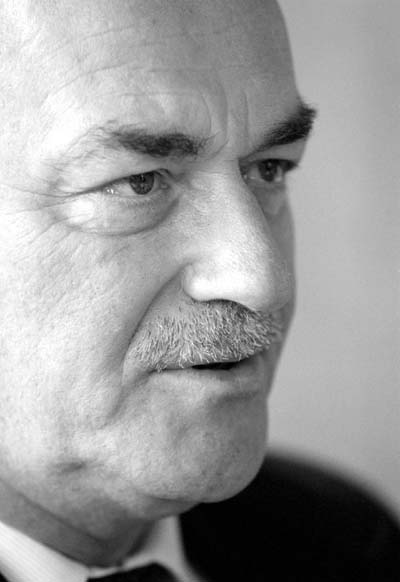english page
Our Man in Minsk
If you are a graduate student in White Russia or Belarusse
with ambitions to continue your research in the Netherlands, ir.
Ton van Kemenade is the man to see. During the past three years
he has recruited more than fifty promising people for positions
at universities in the Netherlands (including TU/e) and Belgium.
His students have also found places with companies like Philips
and Baan.
 Van Kemenade works at the
Belarussian State University in Minsk, where he lives with his
Russian wife. He works at the university's International Graduate
School of Business and Management of Technology and focuses on
the field of innovation. He also advises businesses in Russia
on this subject, of which he has broad practical knowledge.
Van Kemenade works at the
Belarussian State University in Minsk, where he lives with his
Russian wife. He works at the university's International Graduate
School of Business and Management of Technology and focuses on
the field of innovation. He also advises businesses in Russia
on this subject, of which he has broad practical knowledge.
Part of his brief at the Belarussian State University is to find
students post-graduate or post-doc positions in the Netherlands.
Dutch universities like TU/e are only too happy to comply and
to take him on as a recruiter. Van Kemenade is in the Netherlands
approximately once every month to talk to graduate students and
universities. Cursor caught him on his way to TU/e's 'Mathematics
for Industry' institute.
Initiative
"Successful foreign graduate students and post-docs have
a good knowledge of English," says Van Kemenade. "I
am much more careful about this now than when I started recruiting,
when I thought people would learn as they went along. But that's
not practical if a student is to do well in a foreign graduate
school. You can't assimilate knowledge effectively if you have
to keep translating lectures."
Other obvious criteria for success are excellent grades and/or
technical skills. But the right attitude is also important. "I
try to find out if someone will be able to function in a western
university environment. I like students who show initiative and
who don't wait for someone to tell them what to do. They shouldn't
be afraid to put forward their own ideas."
Realistic
"In the time I've been recruiting, people in the Russian
scientific community have become much more realistic about the
West," Van Kemenade continues. "Everyone agrees that
young people should travel. However, it's also important to maintain
ties with your home base. I've noticed that students working abroad
have a marked effect on the universities they come from. We're
seeing more combined activities, for instance, a course in embedded
software by Philips Natlab will soon start in Minsk."
For every graduate student
Van Kemenade places with a Dutch university, a contribution goes
to a special research fund managed by four universities in Belarusse.
This is used to finance the best research ideas from the White
Russian and Belarussian universities involved.
"There is a wealth of great ideas at the Belarussian universities
I'm familiar with. But with no funds, these ideas stay on the
drawing board. What we're trying to do now is to develop some
of the more commercial ideas in co-operation with Western businesses
and to then use part of the profits to fund other interesting
research proposals."
Scare
Should Russia be worried that her best people are leaving? Van
Kemenade thinks not. "When I graduated from TU/e in 1969
we all wanted to leave for America. There was a big discussion
in parliament about what could be done to stop this brain drain.
All these years later, it's apparent that there was no brain drain.
There was also the same kind of scare in the Netherlands then
as there is now about too few people going into science to fill
jobs in industry. I think that things will turn out all right
for the Belarussian universities, just as they did for the Dutch
universities in the seventies."
Innovation
projects
Van Kemenade also runs his own business AP&M International
- from which he works on innovation projects in his new country.
He is big on co-operation between Eastern and Western European
companies. "These days I'm involved with conversion of military
activities to commercial civilian enterprise. This costs a lot
of time and money. The last is not plentiful in Russia, so partnerships
with Western European companies are absolutely necessary."
Van Kemenade considers it a privilege to be closely involved in
change processes in Belarusse. "Step by step, autocratic
organisations are turning into modern companies. This is also
true for society as a whole. Slowly, the old Soviet institutions
are looking to the future. You can feel a new elan taking hold."
/.







